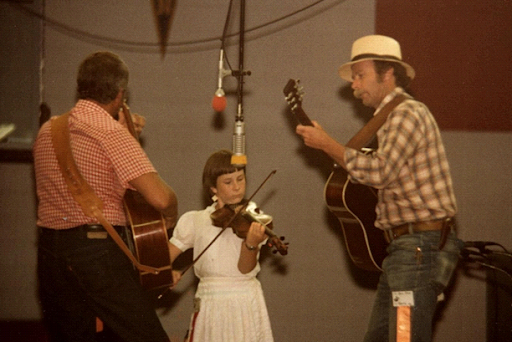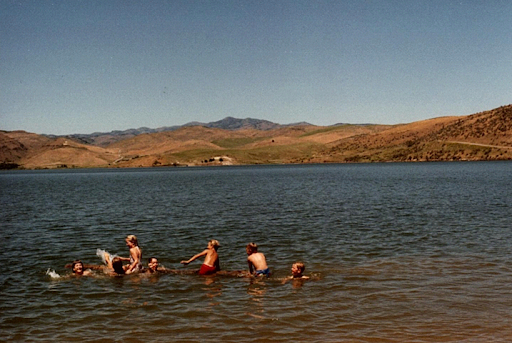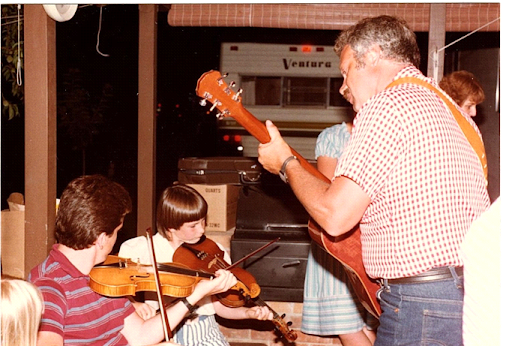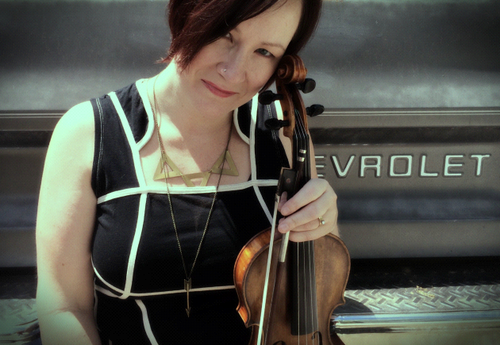Originally from Redding, California, Megan won the Weiser small fry championship in 1983, the junior-junior Division in 1985, ‘86, and ‘87 and the young adult division in 2003 and ‘04. She also won state fiddle championships in California, Kentucky, Georgia, Minnesota, and Colorado. Her students have won championships in at least sixteen states. Megan has judged the Weiser contest three times, as well as many championships throughout the country. Megan directs her own Fiddlestar Youth and Adult Fiddle Camps and she is in constant demand at highly respected music camps across the United States. Two of her earliest students are Tristan and Tashina Clarridge, who have won the Weiser grand championship six times since 2002.
Currently Megan is a touring musician, recording artist, teacher, singer, and flatfoot dancer. She recently finished a four year touring stint with country music artists Pam Tillis and Lorrie Morgan. She also has played with prominent bluegrass musicians Dale Ann Bradley, Roland White, Larry Cordle, Jim Hurst, Chris Jones, 3 Fox Drive, Due West, Chris Stuart, and BEML (the duo of banjo wizard Bill Evans and Megan). Megan has fiddled and sung on more than two dozen recording projects. Recently she issued the CD The Comprehensive Fiddler and a solo fiddle album Something, Old, New, Borrowed, Blue.
In a recent phone interview, we asked Megan to share thoughts about her fiddling career and many trips to the Weiser fiddle contest. She said she owes a huge debt to her early teachers in the incredible fiddle scene around her hometown of Redding, specifically mentioning Dr. Bill Jacoby (father of virtuoso J’Anna Jacoby), Evelyn Horner, Sam Sloan and Jana Jae. For eight years, Megan also took classical violin lessons at the urging of her mother but said she much preferred fiddling.
Megan vividly recalls her first trip to Weiser in 1981 at age six, when she competed against twelve year olds and finished 36th, there being no small fry division at the time. The following year she finished 20th and in 1983 took the inaugural small fry division prize. Megan fondly remembers the long drive (“exactly five hundred miles) from Redding with her mother Maria in their 1972 Monte Carlo while listening over and over to the only two cassette tapes they owned – Floyd Cramer’s Greatest Hits and the Pure Prairie League’s Busting Out. They would arrive on Sunday afternoon in time for a swim at Mann’s Creek Reservoir and then partake in the Sunday evening potluck and jam at Jean and Loren Begley’s house, known as Begley's Corner, just across the street from the high school. campground. Since Megan’s mother hated camping, they stayed at the State Street Motel until it was condemned. After that, they stayed at the Indian Head Motel for one year and then on to the Colonial Motel where they've had the same room for about twenty years. Money always was tight in Megan’s family and Weiser was a big item in their annual budget, showing the importance of the fiddle contest to them. 2015 will mark their 34th consecutive year at Weiser.
Megan vividly recalls her first trip to Weiser in 1981 at age six, when she competed against twelve year olds and finished 36th, there being no small fry division at the time. The following year she finished 20th and in 1983 took the inaugural small fry division prize. Megan fondly remembers the long drive (“exactly five hundred miles) from Redding with her mother Maria in their 1972 Monte Carlo while listening over and over to the only two cassette tapes they owned – Floyd Cramer’s Greatest Hits and the Pure Prairie League’s Busting Out. They would arrive on Sunday afternoon in time for a swim at Mann’s Creek Reservoir and then partake in the Sunday evening potluck and jam at Jean and Loren Begley’s house, known as Begley's Corner, just across the street from the high school. campground. Since Megan’s mother hated camping, they stayed at the State Street Motel until it was condemned. After that, they stayed at the Indian Head Motel for one year and then on to the Colonial Motel where they've had the same room for about twenty years. Money always was tight in Megan’s family and Weiser was a big item in their annual budget, showing the importance of the fiddle contest to them. 2015 will mark their 34th consecutive year at Weiser.
|
Megan Lynch at Weiser in 1985, jamming with John McKinnon and Al Myers at Begley's camp.
|
Megan in Nashville in 2014.
|
At Weiser in 1986, after Megan won the junior-junior division, she got a phone call from a producer for Johnny Carson’s Tonight Show asking her to submit a video and song as an audition for the show. A frantic search of the campground produced a video which they submitted. Over her mother’s advice to submit something more lively, Megan insisted on submitting her rendition of Black and White Rag and a waltz of some sort. The producer called back to say the video was great but asked if could she submit an audio track that had more entertainment value. Strong willed Megan stood her ground, saying these tunes were what won her the contest and that's what the audience should hear. Thus, Megan missed the opportunity to play her fiddle as an eleven year old for a national television audience.
In thinking about changes she has observed at Weiser since her first trip in 1981, Megan opined that the 1970s seemed to be an era when the bar was raised for fiddling creativity and the technical bar was raised in the 1980s. Also, there seemed to be an increasing emphasis on the art of competing, versus the more general art of fiddling. However, through it all, it was the sense of musical community at Fiddle Week rather than the contest per se that kept Megan and her mother coming back for over three decades. She also recalled that her mother never let her leave a contest until the finals were over, even if she washed out in the first round. It was a simple matter of respect for the other musicians – and she might learn something. Megan recalled with great fondness the variety of fiddle styles she heard at Weiser in addition to Texas contest fiddling, singling out Vivian Williams and Gary Moore as particular inspirations.
Megan says that the Weiser experience shaped her as a musician and informs all of her music today. And, Weiser serves as a wonderful proving ground for her students. In 2014, in her annual pilgrimage to Weiser, she competed in the open division and finished 7th. In 2014, Megan and her husband led the Kids' Bluegrass Academy and she has taught workshops during Fiddle Week almost every year of the last decade.
Looking to the future, Megan hopes that Weiser’s strong sense of musical community continues and that musical styles and songs in the contest and around the campgrounds continue to diversify, feeling this is a key to sustainability in view of the realities in changing American demographics. She strongly endorses the expansive concept of making NOTF and the Institute campus a center for traditional arts of all kinds on a four seasons basis.
In thinking about changes she has observed at Weiser since her first trip in 1981, Megan opined that the 1970s seemed to be an era when the bar was raised for fiddling creativity and the technical bar was raised in the 1980s. Also, there seemed to be an increasing emphasis on the art of competing, versus the more general art of fiddling. However, through it all, it was the sense of musical community at Fiddle Week rather than the contest per se that kept Megan and her mother coming back for over three decades. She also recalled that her mother never let her leave a contest until the finals were over, even if she washed out in the first round. It was a simple matter of respect for the other musicians – and she might learn something. Megan recalled with great fondness the variety of fiddle styles she heard at Weiser in addition to Texas contest fiddling, singling out Vivian Williams and Gary Moore as particular inspirations.
Megan says that the Weiser experience shaped her as a musician and informs all of her music today. And, Weiser serves as a wonderful proving ground for her students. In 2014, in her annual pilgrimage to Weiser, she competed in the open division and finished 7th. In 2014, Megan and her husband led the Kids' Bluegrass Academy and she has taught workshops during Fiddle Week almost every year of the last decade.
Looking to the future, Megan hopes that Weiser’s strong sense of musical community continues and that musical styles and songs in the contest and around the campgrounds continue to diversify, feeling this is a key to sustainability in view of the realities in changing American demographics. She strongly endorses the expansive concept of making NOTF and the Institute campus a center for traditional arts of all kinds on a four seasons basis.




